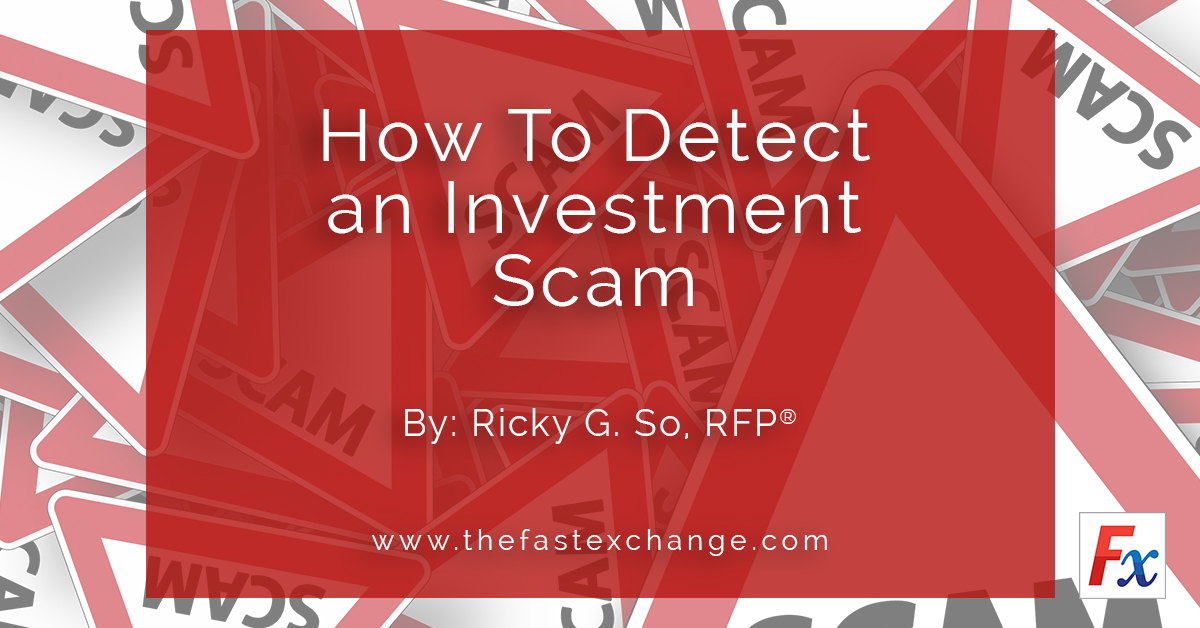
Philippines is an improving economy. Per capital income has been increasing consistently. The quality of life has generally improved. Filipinos, in general, are in good financial conditions. But in the field of finance, this kind of good news correspond to the existence of a financial menace, the investment scams. In fact, investment scams thrive in any season whether good or bad. If it is good, there is abundant flow of money available for unscrupulous people to prey on. On the other hand, in times of a disaster, an investment scam will exploit distraught people by providing renewed hope to its participants. And we have seen both situations unfolded in the past decade. It thrives in our country mainly because most people are not familiar with investments and not well educated in it. This is the reason, even a well-schooled individual is not exempted from being victimized by a scammer particularly in the area of investment.
So, how can we protect ourselves and even our loved ones from falling prey into one? Well, there are several ways by which we can protect ourselves from it. We have to know the tell-tale signs of an investment scam.
The first sign is it promises a high return than usual - and could hardly be explained how it can be generated. More so, they will guarantee it. Most of the scams we saw has this characteristic, a guaranteed return or income. Why so? Because when there is a guarantee, it will not elicit questions from the investor to participate. More questions can be asked if an investment proposal has no guarantees. Also, most (amateur) investors are looking for this kind of offering. For them a guaranteed income or return is less risky than that of a non-guaranteed earning investment. That is why we brand them as amateurs. More knowledgeable investors understand the concept of risk and reward. The higher the return, the higher the risk. So a higher guaranteed return is definitely risky. A higher return or income is made mainly to entice participation. I am not against high returns, if it can explained how it is being generated. If the intention of a high return is to discourage further questioning of the operation of an investment, then I can surmise they are not and don’t intend to be transparent about it. Look around and you will see that most legit investments do not guarantee a return. If a legitimate investment guarantees when it is not supposed to, we call this misrepresentation. This can be sanctioned by the regulator.
Second, the investment proposal has not much marketing materials. It is usually spread through ‘word of mouth’ and successful stories of investors making money on it. The rational in this practice is to lessen scrutiny on the investment scheme and clearly, lessen cost of soliciting investments. This investment trait is not normal for a legitimate investment scheme. Legitimate investment schemes has sufficient materials for providing information about the product. Sometimes, these materials are imposed on them by regulators. So, if an investment scam operator will provide materials, it is exposing itself to greater scrutiny to knowledgeable investors and will create an evidence against them.
Third, the solicitor is not licensed to solicit that particular investment. The person is simply commissioned by the sham company to solicit and pays a commission for successful recruit. For one, they are not licensed to do it nor regulated for it. Most of these companies are simply registered with (usually) the Securities and Exchanges Commission (SEC) as a corporate entity and has no license to venture into investment operation more so, solicitation. A lot people do not know that soliciting investments is not for everyone who can just solicit. It requires a license to do so after passing a validation exam from regulators. Our country’s regulators are the Bangko Sentral ng Pilipinas (BSP), the Securities and Exchange Commission (SEC) and the Insurance Commission (IC). Without a license issued by these regulators, the person soliciting investment is in violation of law and so is its principal company being represented.
Fourth, the company doing the investment operation is licensed to do so. We call this a secondary license. Much like having a solicitor’s license, the company should be licensed as well. Most investment scamming companies will only show the SEC registration as a company. This is their primary license. A license to operate as a company based on their articles of incorporation. BUT if they will be operating an investment scheme, a company is required to secure a secondary license which is difficult to secure and has stringent requirements unlike the primary license or registration of the company. This license is specific as to what they can do or cannot do. This follows that the person representing the company venturing into an investment activity should be licensed as well by going through a rigid seminar and passing a validation exam.
Lastly, one just have to employ common sense into this by asking the question, “how is the return or income possible?” if it so, “why are they giving that away to the public?” And if they are in business, “how much are they making in profits from the operations?” The company should be profitable too right? Then if we add it all up - the company profits, the operations expense, the commission of the solicitor, and the promised return to the investor, “Can the investment venture cover all these amounts?” Common sense will tell us that is may be a tall order. Then, what could be their motivation in recruiting more investors, if their operations is so successful and has low risk? Why give it away? Sadly in situations like this, an amateur investor will not invoke common sense but greed and convenience take over in decision making. Their sense is telling them that if it will work out, they will be rich quick. Therefore, we can conclude that this practice will likely continue for more generations to come. The only time these investment scams will stop is when we put a stop to investment ignorance.


Leave a Reply